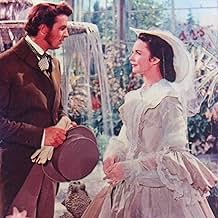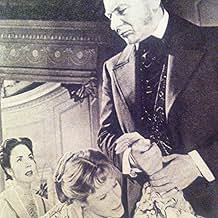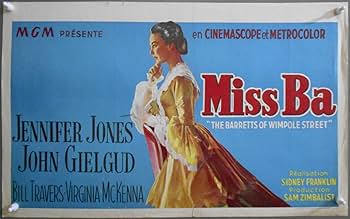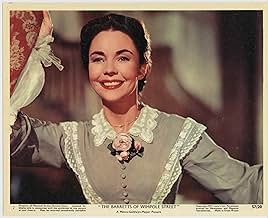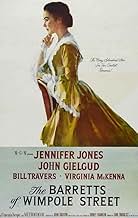Füge eine Handlung in deiner Sprache hinzuElizabeth Barrett's tyrannical father has forbidden any of his family to marry. Nevertheless, Elizabeth falls in love with the poet Robert Browning.Elizabeth Barrett's tyrannical father has forbidden any of his family to marry. Nevertheless, Elizabeth falls in love with the poet Robert Browning.Elizabeth Barrett's tyrannical father has forbidden any of his family to marry. Nevertheless, Elizabeth falls in love with the poet Robert Browning.
- Regie
- Drehbuch
- Hauptbesetzung
Christopher Cooke
- Minor Role
- (Nicht genannt)
Empfohlene Bewertungen
"The Barretts of Wimpole Street" (1957) is a word-for-word remake of the classic 1934 version by the same name. And, as such, I wonder why anyone should even bother seeing this film. After all, since the original version was a very nice and well-acted film (despite Charles Laughton overacting a bit), I can't see seeing a re-make--especially one that took almost no effort to make. Now I am not saying the 1957 film is bad--it is lovely to look at and the story is interesting. I just don't believe in rewarding studios for slap-dash remakes. In fact, unless the original film is seriously flawed and the remake corrects this, I can see no logical reason to see the remake and usually make it a habit to avoid them! So why did I watch the 1957 film? Well, I was flying cross-country and this film was one of the choices on the menu for in-flight films. And, in this sense, it fit the bill--and was pleasant but not particularly inspired.
Being owned by two English cocker spaniels my comments are a bit biased.
This film is intriguing, not just for the overall story but the way Flush, Elizabeth's cocker, was so much integral part of it. Given the 120 line poem that she wrote about Flush it was pleasing to see that Flush was very much a part of the movie.
Sir John Gielgud was a superb actor cast in the role of Elizabeth's tyrannical father. Jennifer Jones performance above par. And of course there was Flush. One very lucky cocker spaniel.
This film is intriguing, not just for the overall story but the way Flush, Elizabeth's cocker, was so much integral part of it. Given the 120 line poem that she wrote about Flush it was pleasing to see that Flush was very much a part of the movie.
Sir John Gielgud was a superb actor cast in the role of Elizabeth's tyrannical father. Jennifer Jones performance above par. And of course there was Flush. One very lucky cocker spaniel.
Twenty years earlier the same director made the same film in black and white, and this is supposed to be an improvement. It is in technicolour, and it is hard to believe any version could be better. They should actually be quite equal, as both versions use the same script and the same music - only the actors are different. It is also hard to believe that any actress could be better than Jennifer Jones, a specialist in sensitive roles approaching a breaking point, and it is also hard to believe that Fredric March was more perfect in the role than Bill Travers, who couldn't have been more convincing. On the other hand, John Gielgud and Charles Laughton should really have been equals in the formidable role of Edward Barrett, a Dickensian tyrant of the highest degree, who must be the more pitied for his fatal lack of understanding and psychology, refusing to realise that by exerting total strict control of his children they must be stifled, as Elizabeth expressly says, "I am a dying woman", only because of her overbearing father, while Browning actually restores her to life and makes her live for the first time in her life. The actors are all outstanding, but the greatest credit is with the play, which was rightfully a tremendous success from the start, and both films just have to make the play triumph.
This version of The Barretts Of Wimpole Street lacks for nothing, it's certainly an improvement over the 1934 version in a technical sense with the wide screen and color. It even has the same musical theme that Herbert Stothart wrote for the earlier version that starred Norma Shearer, Fredric March and Charles Laughton.
Jennifer Jones was following in some mighty big footsteps in portraying Elizabeth Barrett. Not only Norma Shearer's, but Katherine Cornell who originated the role in the original Broadway production in 1931 which ran for 370 performances in those Depression years. That is something that should tell you more than anything else about how good this play is. Jen creates her own sense of intelligent regal beauty as the frail poetess who summons up the courage and strength to stand up to her tyrannical father.
Charles Laughton was widely quoted as saying that in his portrayal of the issue ridden Moulton Barrett, the censors couldn't censor the gleam in his eye to get past the Code. The Code by 1957 was cracking and John Gielgud used a couple of direct physical moves rather than camera closeups to show his incestuous feelings for his daughter. Gielgud still gives a fine account of himself, though Mr. Laughton set the standard for that role. On stage it was originated by Charles Waldron who moviegoers will best remember from his last part as General Sternwood in The Big Sleep.
Bill Travers plays a somewhat different Robert Browning than Brian Aherne on stage and Fredric March on the screen. Both of those men are refined types and Browning is a bit more boisterous in this film than he was in the previous one. Still he's ready to do right by Jones and take her from the tyranny she lives under.
Though the 1934 film is an MGM classic, none of the people associated with this version have anything to be ashamed about. This is a story that could be made today. I can see the casting already, Hugh Grant as Robert Browning, Kate Winslet as Elizabeth Barrett, and Tom Wilkinson as Moulton.
I'd pay for a ticket to that. Until then we have two very good classic screen versions.
Jennifer Jones was following in some mighty big footsteps in portraying Elizabeth Barrett. Not only Norma Shearer's, but Katherine Cornell who originated the role in the original Broadway production in 1931 which ran for 370 performances in those Depression years. That is something that should tell you more than anything else about how good this play is. Jen creates her own sense of intelligent regal beauty as the frail poetess who summons up the courage and strength to stand up to her tyrannical father.
Charles Laughton was widely quoted as saying that in his portrayal of the issue ridden Moulton Barrett, the censors couldn't censor the gleam in his eye to get past the Code. The Code by 1957 was cracking and John Gielgud used a couple of direct physical moves rather than camera closeups to show his incestuous feelings for his daughter. Gielgud still gives a fine account of himself, though Mr. Laughton set the standard for that role. On stage it was originated by Charles Waldron who moviegoers will best remember from his last part as General Sternwood in The Big Sleep.
Bill Travers plays a somewhat different Robert Browning than Brian Aherne on stage and Fredric March on the screen. Both of those men are refined types and Browning is a bit more boisterous in this film than he was in the previous one. Still he's ready to do right by Jones and take her from the tyranny she lives under.
Though the 1934 film is an MGM classic, none of the people associated with this version have anything to be ashamed about. This is a story that could be made today. I can see the casting already, Hugh Grant as Robert Browning, Kate Winslet as Elizabeth Barrett, and Tom Wilkinson as Moulton.
I'd pay for a ticket to that. Until then we have two very good classic screen versions.
MGM were on the slide in the fifties. They decided to combat the decline in audiences by remaking past successes in colour and wide-screen. Sometimes this worked as with Ben Hur,but mostly failed abysmally. This is a case in point. They didn't bother to do research into whom would be interested in seeing this film. They remade the 1934 film. Now colour was fine but wide-screen is ridiculous. This is a stage bound film and the pictorial composition is dictated by this. People conversing for both edges of the screen and inability to compose close ups.
This film is quite full at times. Better leading actors were essential to give this a chance of being remotely interesting.
This film is quite full at times. Better leading actors were essential to give this a chance of being remotely interesting.
Wusstest du schon
- WissenswertesBill Travers and Virginia McKenna got married in September 1957, after the January 1957 release of this film. Travers plays the role of poet Robert Browning, Elizabeth's love interest, and McKenna plays Henrietta, Elizabeth's younger sister.
- PatzerThe London pillar boxes weren't painted red (as seen) until 1874; before that, they were green.
- VerbindungenReferenced in Wogan: Folge #10.35 (1990)
- SoundtracksWilt Thou Have My Hand
Music by Herbert Stothart
[Elizabeth and all her siblings sing the song in her bedroom as she plays the piano; theme heard in the score throughout the movie]
Top-Auswahl
Melde dich zum Bewerten an und greife auf die Watchlist für personalisierte Empfehlungen zu.
Details
- Erscheinungsdatum
- Herkunftsländer
- Sprache
- Auch bekannt als
- Lo que las paredes ocultan
- Drehorte
- Marylebone Church, Marylebone, London, England, Vereinigtes Königreich(wedding sequence)
- Produktionsfirma
- Weitere beteiligte Unternehmen bei IMDbPro anzeigen
- Laufzeit1 Stunde 45 Minuten
- Seitenverhältnis
- 2.55 : 1
Zu dieser Seite beitragen
Bearbeitung vorschlagen oder fehlenden Inhalt hinzufügen

Oberste Lücke
By what name was The Barretts of Wimpole Street (1957) officially released in India in English?
Antwort



